Telangana SCERT TS 7th Class English Study Material Pdf Unit 7A The Wonderful World of Chess Textbook Questions and Answers.
TS 7th Class English Guide Unit 7A The Wonderful World of Chess
Pre-Reading:
Look at the following pictures.
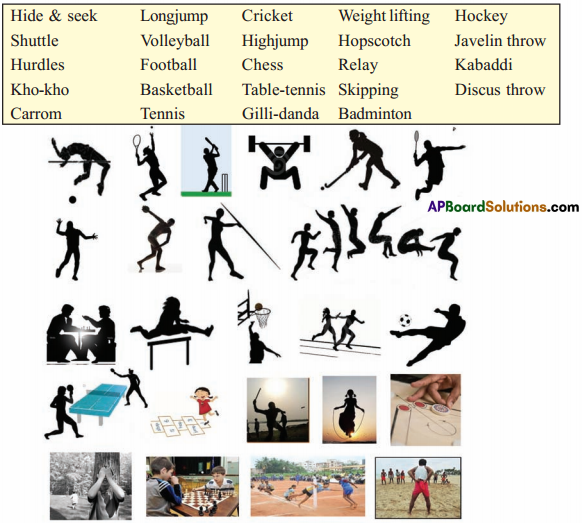
Question 1.
Name the games and sports that you see in the picture.
Answer:
1. Highjump
2. Tennis
3. Cricket
4. Weight lifting
5. Hockey
6. Shuttle badminton
7. Volleyball
8. Discus throw
9. Javelin throw
10. Longjump
11. Chess
12. Hurdles
13. Basketball
14. Relay
15. Football
16. Table-tennis
17. Hopscotch
18. Gilli-danda
19. Skipping
20. Carrom
21. Hide & seek
22. Chess
23. Kho-kho
24. Kabaddi.
![]()
Question 2.
Name the games and sports that you play.
Answer:
I play chess, basket ball, throw ball, carroms, table tennis, cricket, skipping, hide and seek, kho-kho, kabaddi and shuttle badminton.
Question 3.
Write the names under appropriate picture.
Answer:
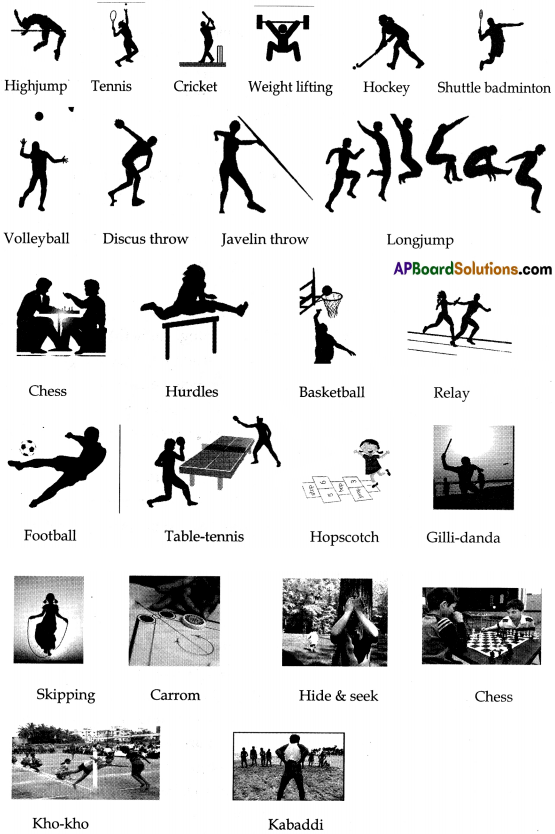
![]()
Oral Discourse:
Talk on : Your favorite game or sport.
Answer:
My favourite game is Shuttle badminton. I love playing the game. It keeps me physically and mentally fit. It can be played by two or four players. It is played with a rocket and a cock and is played in a court. It is strictly a disciplined game. It refreshes both the mind and body. It rejuvinates the player and keeps him active throughout the day. I feel fresh after playing the game and feel active the whole day.
I. Read quickly and answer the following questions :
Question 1.
Is chess played only in a few countries or all over the world ?
Answer:
Chess is played all over the world. It has won the hearts of every thinking animal on earth.
Question 2.
Who invented chess ?
Answer:
According to Puranas Mandodari, the wife of Ravana Brahma invented chess. (or)
According to H.J.R. Murray, a historian said that it was invented by a scholar from North-west India around 5th century.
Question 3.
Is chess an expensive game ?
Answer:
No, chess is not an expensive game. It is an indoor game. Anybody can play it by spending a little amount to buy board and coins.
Question 4.
Can the chessmen move in any way they like ?
Answer:
No, chessmen can not move anyway they like. The rook, the knight, the bishop etc. move on the board in quite a restricted way.
Question 5.
What is the national body for chess ?
Answer:
The national body for chess is All India Chess Federation which is affiliated to the World Chess Federation.
Question 6.
Do we have good chess players in India? Name a few.
Answer:
Yes, we have very good chess players such as Viswanathan Anand, Dibyendu Barua, Manuel Aaron, Krishnan Sasikiran, Koneru Flampi, Dronavalli Harika etc.
![]()
II. Now read the essay paying special attention to the words in bold print. Guess their meanings and check them with the glossary.
Answer:
Refer Glossary.
Answer the following questions individually. Then, discuss your answers with the members of your group.
Question 1.
Who do you think invented chess, Mandodari or the scholar from North-west India ? Why ?
Answer:
I think Chess was invented by a scholar from North-west India around fifth century. A famous historian called H.J.R. Murray declared this after making a lot of research.
Question 2.
The story did not tell anything about what the king had done. What do you think had happened ? What would you have done if you were the inventor (or the king) ?
Answer:
The King might have been surprised and wondered. He might be in speechless condition. He might have lost his power of reason, presence of mind and so he didn’t do anything.
Question 3.
Can a pawn capture the queen ? Support your answer quoting from the essay.
Answer:
Yes, pawn can capture the queen. It can go one square diagonally when it captures one of his opponent’s men; even if it is the mighty king.
![]()
Question 4.
In what way are the rook and the bishop similar ?
Answer:
The bishop and the rook can move to any square provided it is on their path. In this way the rook and bishop are similar.
Question 5.
Which of the chessmen do you think is the most powerful one ? Why ?
Answer:
The queen (Mantri) is powerful one. It can move in any direction.
Question 6.
The possible positions of some chessmen (represented by a four-point star) are dotted in the following pictures. Match them with the appropriate piece.

Answer:

Question 7.
A rook, a knight, and a bishop are shown in the picture. Put a cross in all the squares that the rook can go. Put a tick in all the squares that the knight can go.
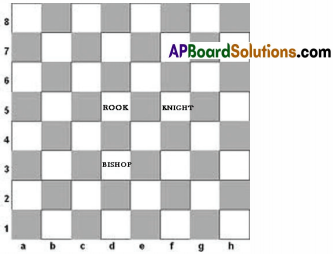
Answer:
Look the picture
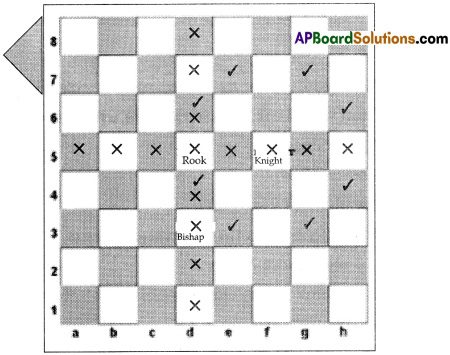
![]()
Vocabulary:
I. In an expository essay like this, you often find many clues that help you guess the meaning of unfamiliar words: if there arc any. For example, in the first two sentences, if the word ‘vanish’ is unfamiliar to you, you can guess its meaning from the next sentence. Both the sentences arc similar.
You know that ‘kings’ in the second sentence is related to ‘kingdoms’ in the first sentence. Hence you can guess the meaning of ‘vanished’ from ‘gone’. This is supported by bbut and ‘remained with us’ in the third sentence. While guessing the meaning, the overall theme, the meaning of the paragraph, and the meaning of other sentences help you.
Look at the following sentences taken from the essay. Discuss them ¡n your group and discover the clues that help you guess the meaning of unfamiliar words. The next time you read a text, try to guess the meaning using the available clues.
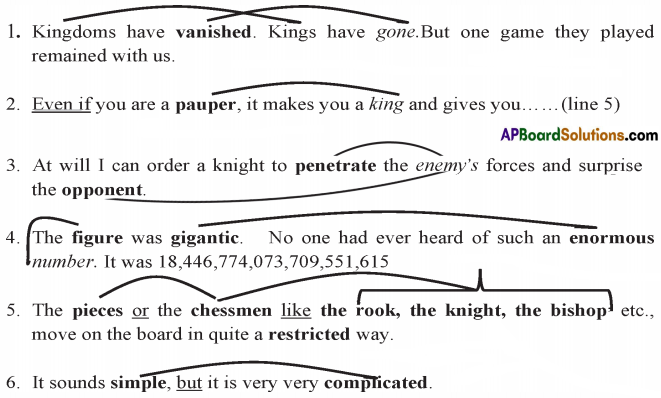
II. You have learnt that the king, the queen, the bishop, etc. are called ‘chessmen’. So, you can call any of them a ‘chessman’. This is a special word that represents six names. Such a word that includes the meanings of other particular words is called a ‘superordinate’ word of a ‘hypernym’. The words that are included in a hypernym are called hyponyms. In the above example, chessman is the hypernym.
Its hyponyms are ‘king’, ‘queen’, ‘bishop’, ‘knight’, ‘rook’, and ‘pawn’. A hypernym can be a hyponym of another hypernym. For example, rose, brick red, dark red, and crimson are hyponyms of ‘red’. But red is a hyponym of ‘colour’. This can be illustrated like this.

Look at the 25 pictures and the words given at the start of the unit and identify hypernyms and hyponyms. Use the diagram given below. You can add some more words from your vocabulary.
III. In groups, draw similar diagrams on charts to show hypernyms and hyponyms related to sports, strength sports, athletics, runs, sprints, relays, jumps, and throws. Display them in the class.
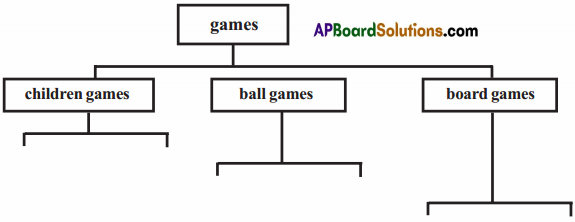
Answer:
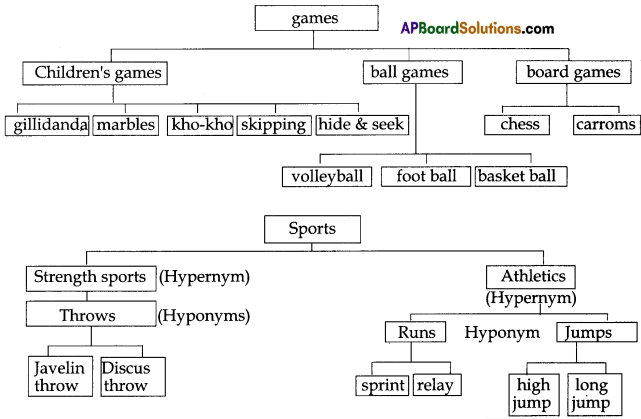
![]()
Grammar:
I. Study these sentences:
1. If you want an idea of how big this number is, imagine you have this much money.
2. Then, if you spend one crore rupees every second of your life, it takes approximately 60,000 years for you to spend all the money.
3. If she does that, she calls out ‘checkmate’ and wins the game.
4. If you are on the lookout, you will find many invitation tournaments conducted at school, village, mandal, district and state levels.
In the above sentences, a condition is expressed using ‘if-clauses’. Notice the comma at the end of the clause. The clause that follows it is the main clause.
Notice the tense in both the clauses – it is simple present. However, sentence 4 has ‘will’, denoting ‘future’.
Sentences 2 and 3 talk about what happens when the condition is met, whereas the first sentence asks the listener/reader to do something when the condition is met with (notice the imperative in the main clause).
If – clauses: type 0 and 1
Sentences 2 and 3 talk about what is certain according to mathematics and according to the rules of chess respectively. This type of condition is called if- clause type 0. This is also used to talk about universal truths, common sense, experience, and facts decided by science. Eg. 1. If you heat ice, it melts. 2. If you put blue litmus paper in any acid, it turns red. 3. If you step on a snake, it bites.
Sentence 4 is an example of if-clause typel. Here ‘will’ is used in the main clause to talk about the possibility of an action in the future.
Sentence 1 has an imperative in the main clause. We do not know whether it will be fulfilled or not. Since this too expresses possibility, it comes under if-clause type 1.
Notice that if-clause type 0 does not talk about possibility. Usually, it talks about certainty. It does not use ‘will’ or any other auxiliary in the main clause.
II. Read the following sentences and underline the if-clauses. Then, decide whether they are type 0 or type 1. Discuss and then write ’O’ or T against each sentence. The first one is done for you.
1. You need not buy pink colour. If you mix red and white, you get pink. – 0
2. Listen to your father. If you do not listen to him, you will be in trouble.
3. My brother said, “If you want to get good marks, why don’t you study harder?”
4. Do not take away my homework book. If you do it once again, I will take you to the headmaster.
5. I have a number in my mind. If you divide it by 2 you get zero. If you multiply it by 2, you still get zero. What is it ?
6. My science teacher said, “If you keep phosphorous in air, it catches fire.”
7. It is getting late. If we do not take a taxi, we will not catch the train.
8. Miss Bhanu is very strict. If I am late, she will stand me in the comer.
9. My social teacher said, “If the demand increases, the prices go up.”
10. My English teacher said, “If you want to learn English, read a lot.”
Answer:
Key:
1 – 0
2 – 1
3 – 0
4 – 1
5 – 0
6 – 0
7 – 1
8 – 1
9 – 0
10 – 1
![]()
III. Take three type 0 clauses and three type 1 clauses. Replace ‘if with ‘when1 and write the sentences. What did you observe ? Which sentence sounds natural ?
type – 0 clauses
1. If you heat water, it turns into vapour.
When you heat water, it turns into vapour.
2. If the door bell rings, the dog barks.
When the door bell rings, the dog barks.
3. If you heat iron, it expands.
When you heat iron, it expands.
type -1 clauses
1. If it rains, the reception will take place indoors.
When it rains, the reception will take place indoors.
2. If we miss the train, we can get the next one.
When we miss the train, we can get the next one.
3. If I see him, I will give him a lift.
When I see him, I will give him a lift.
From the above sentences, type-0 condition sounds natural.
IV. Write ten sentences with if clause type – 0 and type – 1. Use the following clues if you like.
1. boil – water – turn – steam
2. divide an even number by two – zero
3. disturb a snake – bite
4. save money – help in old age
5. keep quiet – tell a story
6. take medicine – get well
7. meet Ravi Varma – ask – see me
8. buy – two pairs – one pair free
9. help me with English – help with maths
10. miss bus – what you do ?
Answer:
1. If you boil water, it turns into steam – type 0
2. If you divide an even number by two, you will get zero as remainder – type 0
3. If you disturb a snake, it will bite you – type 1
4. If you save money, it will help in old age – type 1
5. If you keep quiet, I will tell a story – type 1
6. If you take medicine, you will get well – type 0
7. If you meet Ravi Varma, ask him to see me – type 0
8. If you buy two pairs, onepair is free – type 0
9. If you help me with English, I will help you with maths – type 1
10. If you miss bus, what will you do ? – type 1
![]()
Writing:
I. Collect some more information about your favourite sport or game and write a brief essay on it.
Answer:
My favourite game is chess. The birth place of chess is India. In olden days it was called Chaturanga.
There are rules for the game. The king can go one square in any direction. The queen can go in any direction any number of squares. The bishop can move diagonally. The rook can go on any number of squares in a straight line. The knight jumps two squares straight and one square sideways. The pawn goes only one square but in killing opponent power, it goes comerwise. If any chessman conquers The king, it is called checkmate. This is a complicated game.
There are associations in district and state level which are affiliated to All India Chess Federation and World Chess Federation. A player can raise to the level of the Grand Master. According to the ratings, Viswanathan Anand was the first Indian to earn the title of Grand Master, as well as World Champion. The game of Chess increases memory power, concentration and logical thinking. Since Chess involves a number of calculations, it increases our mathematical abilities and problem solving skills.
II. The following paragraph has some errors in capitalization, punctuation, prepositions and forms of verb. Correct them and rewrite the paragraph in your notebook.
“Health is wealth.” If we understand this, we can kept ourselves fit. apart from a balanced diet, sports is necessary to maintain our health We may feel that, if we spend our time in playing, when should we study. Here is solution study on the morning as the mind is fresh, after you return home from school, play for about one to two hours as the mind is tired. Then you can study again. So friends, always remember the proverb, “all study and no play makes Jack a dull boy”. This proverb not only apply to jack but for all of us.
Answer:
‘Health is wealth’. If we understand this, we can keep ourselves fit. Apart from a balanced diet, sports are necessary to maintain our health. We may feel that, if we spend our time in playing, when should we study ? Here is a solution. Study in the morning as the mind is fresh.
After you return home from school, play about one or two hours, as the mind is tired. Then you can study again. So friends, always remember the proverb “All study and no play makes Jack a dull boy”. This proverb applies not only for Jack but also for all of us.
![]()
Study Skills:
I. Reference material is usually available in the following forms (See the box below.) Each of them serves a specific purpose. If we know what is what, we will be able to get the information we want without much effort.
manual: a book which gives you practical instructions on how to do something or how to use something, such as a machine
handbook or companion or blue book: a manual which summarizes a subject and is useful for ready reference
directory: a list of references, used for case of locating their subject
atlas: a set of maps, often of geographical locations
dictionary or lexicon : (the latter generally provides more grammatical analysis) : an alphabetical listing of words and their definitions
compendium: a short but complete account of a particular subject
encyclopedia: a book or set of books containing many articles arranged in alphabetical order which deal either with the whole of human knowledge or with a particular part of it:
almanac: a book of information in specific fields, often by date
thesaurus: a list of words with similar, related, or opposite meanings
II. Some books on chess are given below (T.B p.113). The name of the author is in regular font and the title of the book is in italics. The year of publication is within the brackets. Using this information and the information given in the above box, try to answer the following questions:
Question 1.
Who wrote Chess Training for Budding Champions ?
Answer:
Hall, Jesper wrote chess training for Budding Champions.
Question 2.
When was The Diary of a Chess Queen written ?
Answer:
The Diary of a Chess Queen was written in the year 2009.
Question 3.
Name two authors who wrote books for children ?
Answer:
Chandler, Murray & Kidder, Harvey wrote books for children.
![]()
Question 4.
You do not know chess. You want to learn it. Which books will you choose?
Answer:
To learn play chess, I will choose the books such as ‘Learn Chess’, ‘Essential Chess Lessons’ and Chess Training for Budding Champions.
Question 5.
You have come across an unknown term like’King’s Indian’while reading a book. Which book do you consult ?
Answer:
I will consult the book “The Official Blue Book and Encyclopedia of Chess.” When I come across an unknown term like ‘King’s Indian’ while reading a book.
Question 6.
You are learning chess, and you want to know the rules. Which book do you turn to?
Answer:
I will turn to ‘Official Chess Rule Book’ to know the rules of the game chess.
Question 7.
Name a few books which are good for people who are already good players.
Answer:
‘How to use computers to improve your chess’; “Twelve great chess players and their best games’; ‘The complete Idiot’s guide to chess’ etc. books are good for the people who are already good players.
Question 8.
What do you expect to see in the book ‘How Computers Play Chess’ ?
Answer:
I expect the things like how computers work in playing chess and what sort of programmes are incorporated in them.
Question 9.
Pick out the books that give biographical sketches of chess players.
Answer:
‘Twelve Great Chess Players and Their Best Games’; ‘How I Became a Grandmaster at Age 14’ etc. are the biographical sketches of chess players.
Question 10.
Look at the title of the book, How I Became a Grandmaster at Age 14. What does T refer to? Give the name of the person.
Answer:
‘I’ refers to Kosteniuk Alexandra, the author of the book. It is a biography of him.
![]()
Listening and Speaking :
Health and Strength
Hello children! My name is Health and my husband’s name is Strength. The world is our home. We have two daughters. Their names are Games and Sports. They are twins. They look alike. People often mistake Games for Sports and Sports for Games. But if you observe carefully, you will know who is who.
Sports has grace and dignity in every movement and she likes a lot of physical activity. She is not proud, but she doesn’t like the company of others much. Therefore you hardly find any body with her except on festive occasions.
Games, unlike her sister, likes the company of others. You will find at least 2 or 3; and sometimes, as many as people with her. They talk to each other, encourage one another, and enjoy themselves by taking sides and playing against each other. One day games told me that she wanted to marry pleasure, who loved her so much. I remember his name. He is the son my close relative Entertainment.
I performed their marriage in a big stadium. Soon, they had a lot of children (some of them are twins). She gave her wonderful names. I’ll just tell you the names as they come to my mind. OK. ? Here you are. Volleyball, Football, Cricket, Carrom, Kabaddi, Hocky, Table-tennis, ooooom Ah! Yes, Chess. That’s it for now.
OK. Now, let me tell you about my second daughter. One day, as I was taking my evening walk. I found her with a young and energetic boy called Confidence. He is the son of my distant relative from my husband’s side. “They will make a good couple,” I thought. Soon they were married in a very big place called Olympiad. They too had children. In fact as many as Games had.
Confidence, my son-in-law, is very much interested in giving children fancy names. I can never tell you all the names unless you give me enough time. For now, I’ll give you a few. Right ! Here you are. Where can I start ? oooooom. Let me start with my dynamic girl Running. Yes, then you have High jump, Long Jump, Hurdles, Discus Throw, Swimming, Javelin Throw …………… Ah! My memory fails me. Ok children.
Though I cannot give you the names of all my grandchildren, I can show you some pictures of them. I’m sure you will recognize them since they have become popular all over the world. O.K. That’s it for now. Bye!
I. Your teacher will read a story about Health and Strength. Listen to her carefully. When she reads it for the second item, fill in the blanks in the family tree.
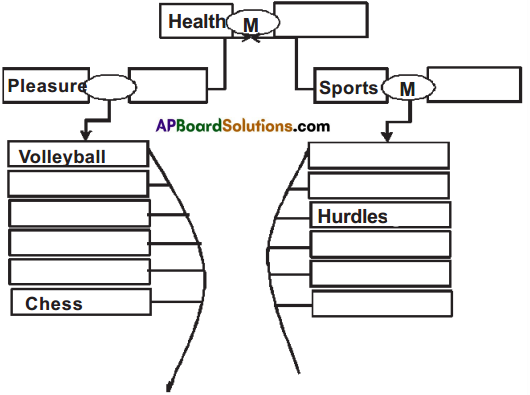
Answer:
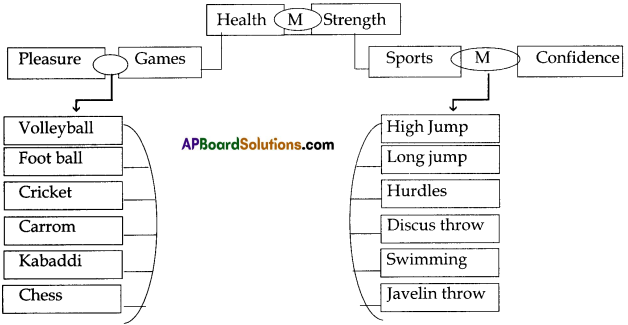
![]()
II. Work in groups. Ask and answer the following questions and complete the table.
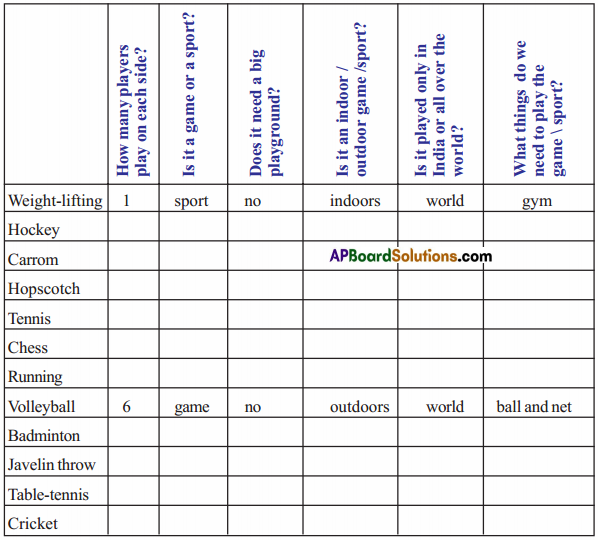
Answer:
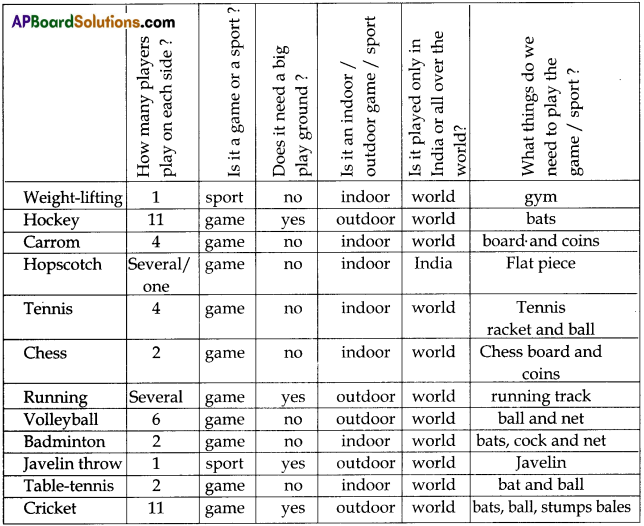
Chess is an indoor game played worldwide by two players. It is played on a square board 8×8 black and white squares. The game is played with chessmen like king, queen, knight, bishop, soldier etc. It is a mind nourshing game. It originated in India.
![]()
The Wonderful World of Chess Summary in English
Chess was played by Kings in ancient days. But still it remains and will remain. All thinking people like this game whatever country they belong to. Many people praise it many ways saying that it betters life.
Chess is India’s gift to the world. It was believed that Mandodari, the wife of Ravana, invented this game. But Murray says that it was invented by a scholar in North West India. When the king wanted to give him a gift, he requested the king to give him one grain of rice for one square, double that in the second square until he reached the 64th square. That was a very large number like 18, 446, 774, 073, 709,551, 615. If one spends one crore of money every second of his life, he would spend his money for 60,000 years.
There are rules for the game. The king can go one square in any direction. The queen can go in any direction any number of squares. The bishop can move diagonally. The rook can go on any number of squares in a straight line. The knight jumps two squares straight and one square sideways. The pawn goes only one square but in killing it goes in a cornerwise. If any chessman conquers the king, it is called checkmate. This is a complicated game.
There are associations in district and state level which are affiliated to All India Chess Federation and World Chess Federation. A player can raise to the level of the Grand Master. According to the ratings, Viswanathan Anand was the first Indian to earn the title of Grand Master, as well as World Champion (2817-rating).
There were Dibyendu Barua (2460), Krishnan Sasikiran (2689), and Negi (2631) at the age of 13. There are Koneru Humpy (2600), Pendyala Hari Krishna (2672) and Dronavalli Harika (2505).
The game of Chess increases memory power, concentration and logical thinking.
Glossary:
vanish (v) = to disappear or stop being present or existing
Usage : The ghost vanished into the air.
pauper (n) = a very poor person
Usage : There are many paupers in our country.
penetrate (v) = to move into or through something
Usage : Light rays cannot penetrate through opaque things.
opponent (n) = a person being competed against in a game or a sport
Usage : Mumbai won the match over his opponent.
accountant (n) = some one who keeps the records of money received, paid and owned
Usage : Mr. Suresh is an accountant in our office.
awe-struck (adj) = Filled with feelings of admiration or respect
Usage : The students were awe-struck when the principal entered the class suddenly.
figure (n) = number
Usage : Add the total of these figures.
gigantic (adj) = enormous, extremely large
Usage : I saw a gigantic hound in a dog’s show yesterday.
restricted (adj) = limited, especially by rules, laws etc.
Usage : Cell phones usage is restricted in the temples.
capture (v) = to take some one as a prisoner, especially by force
Usage: Chatrapati Sivaji captured so many forts.
affiliated (v) = become part of a larger group or organization
Usage : Our college is affiliated to J.N.T.U. Hyderabad.
![]()
the limelight = public attention
Usage : P.T.Usha became a limelight when she won the gold medals.
involve (v) = include
Usage : He is also involved in political activities.
probably = perhaps
Usage : Probably, I may go to Chennai tomorrow.
grain = particle
Usage: You cannot count the grains in the sand.
approximately = nearly
Usage : The amount in the bag is approximately a thousand.
diagonally = cornerwise
Usage : Why do you walk diagonally ? Walk straight.
tournaments = matches
Usage : Tournaments are being conducted in every game.